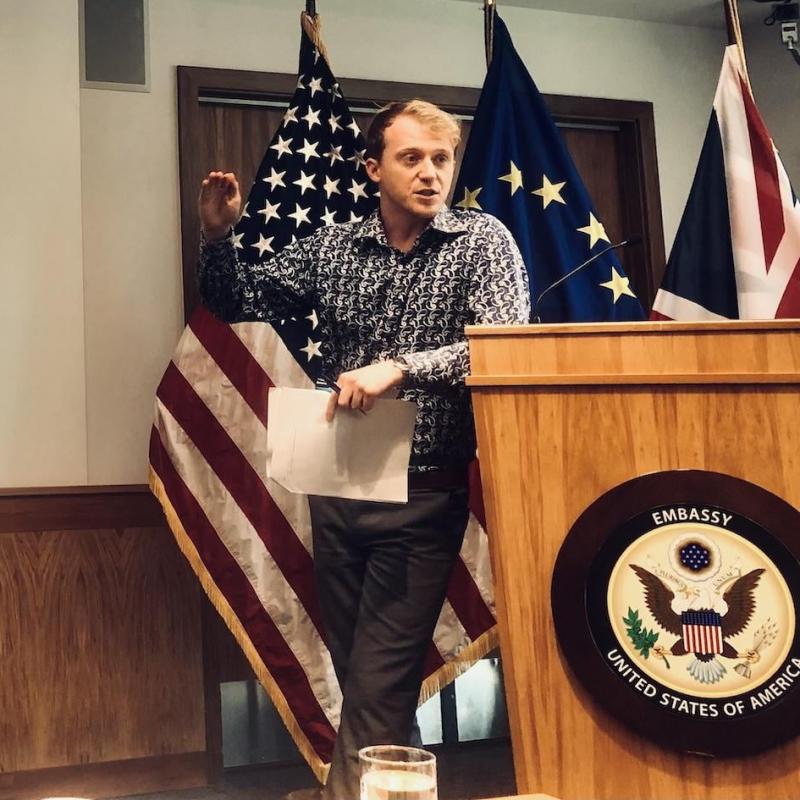Breadcrumb
When Ben Abraham was applying for DPhil courses, he was already fairly certain he did not want to pursue a traditional career in academia.
As a scholar of global environmental policy, Ben believed he could have a greater impact working more directly on policy.
“I really believe in the power of research as well as deep intellectual thinking. I knew these would be part of my future but I wanted to do the DPhil in an environment oriented towards making change in the real world.”
While undertaking an MSc in Global Governance and Diplomacy as a Rhodes Scholar, Ben received two offers to study a DPhil at the University of Oxford – one at the Blavatnik School of Government and the other at the Oxford Department of International Development. He chose the DPhil in Public Policy which, with its policy orientation, aligned more with his motivations for the future.
Ben’s research focus evolved during the course of his DPhil. While he originally wanted to explore how non-state climate action evolved in oil-rich states, his supervisor, Dr Thomas Hale, encouraged him to broaden the analysis and consider the bigger questions behind this. This led to the final focus of exploring how the different environmental ideologies of non-state actors were shaping the future of global climate governance.
“I was quite narrow in my thinking when I was applying for the DPhil. Once I’d started, we really took the ideas for the thesis to another level.”
During his research, Ben built and analysed a huge database of non-state climate action initiatives across the world, involving NGOs, local governments, businesses, multilaterial institutions, and combinations thereof. This work broadened his understanding of the possible avenues through which he could make a difference after the DPhil.
“When I look back to writing my application for the Rhodes Scholarship, I had quite clear ideas about what I wanted to do after. My time at Oxford really demolished that certainty because my horizons were broadened so immensely by the experience. It opened my eyes to many more opportunities and ways to make a difference in the world, as well as a better understanding of the nuance around the challenges I was working on.”
Ben decided to spend some time in Beijing after graduating, having come to appreciate China’s ever-increasing role as a pivotal actor in the global fight against climate change. He spent 2019 studying Mandarin and working with Chinese environmental organisations for most of 2019 before going home to New Zealand and then to the US for work opportunities shortly after.
Unfortunately, the COVID-19 situation began to intensify in early 2020. Ben therefore had to make the tough decision as to whether he would stay in the US and face being stuck away from his family for an extended period, or return to New Zealand straight away.
Ben chose to go back to New Zealand, where he had already applied for a job at the newly formed Climate Change Commission at the suggestion of a friend, even though originally, he did not intend to return for a while.
“It was quite an exciting time in New Zealand as there had finally been some progressive movement on climate change. A net-zero target had been passed into law and this new independent commission had been created to advise the government on its policy.”
As the Commission was brand new, Ben had the opportunity to help build and shape the organisation. During his time there, he worked on the Commission’s first strategic review of the whole of New Zealand’s economy, to advise how the country could meet its climate change targets.
Yet Ben’s time at the Commission has not been without its challenges. Having had many friends who spent the years he was in Oxford tirelessly campaigning for the legislation that created the Commission, he felt a deep sense of responsibility to live up to their hopes and ambitions. This ultimately motivated him to persist in pursuing ambitious outcomes while coming up against the political and bureaucratic challenges of his first experience working in the public sector.
After a year working at the Commission, Ben found opportunity to pursue his international interests at the British High Commission in Wellington as the UK’s advisor on climate change and COP 26 in New Zealand and the Pacific.
“This role was really appealing to me. It was a fixed-term contract, so offered me a chance to have a break from working on domestic issues and get involved with the international scene again while all New Zealand’s borders remained closed.”
With the support of the Commission, Ben took up this new role from July 2021 and got the chance to be involved in hosting COP 26 in Glasgow. Extra motivation came from knowing there was so much on the line following the COVID-19 pandemic, how critical the role of the host country is to the success of these conferences.
Ben returned in March 2022 to the Climate Change Commission, this time to work on a specific project reviewing a partnership between New Zealand’s agricultural sector and the government on pricing and reducing agricultural emissions.
“Given that the agricultural sector is both a massive pillar of New Zealand’s economy and a massive source of our greenhouse gas emissions, reducing emissions in this sector is really challenging. It’s highly politicised and goes to the heart of our economy and our culture.”
After this, exactly what the future holds in store for him is uncertain. But Ben knows he will continue to fight for policy change that supports a safe and equitable climate future for both New Zealand and the world.

